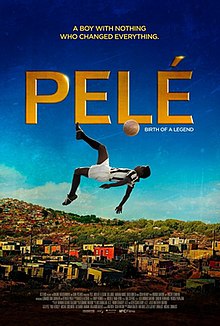Pelé: Birth of a Legend
| Pelé: Birth of a Legend | |
|---|---|

Production poster
|
|
| Directed by |
|
| Produced by |
|
| Written by |
|
| Starring |
|
| Music by | A. R. Rahman |
| Cinematography | Matthew Libatique |
| Edited by |
|
|
Production
company |
|
| Distributed by | IFC Films |
|
Release date
|
|
|
Running time
|
107 minutes |
| Country | United States |
| Language | English Portuguese |
| Box office | $2.3 million |
| Pelé: Birth of a Legend (soundtrack) | ||||
|---|---|---|---|---|
| Soundtrack album by A. R. Rahman | ||||
| Released | Scheduled for June 24, 2016 | |||
| Recorded | 2013–2015 Panchathan Record Inn and AM Studios, Chennai Panchathan Hollywood Studios, Los Angeles |
|||
| Language | English | |||
| Label | Sony Classical | |||
| Producer | A. R. Rahman | |||
| A. R. Rahman chronology | ||||
|
||||
Pelé: Birth of a Legend is an American biographical film about the early life of Brazilian footballer Pelé. The film is directed and written by Jeff Zimbalist and Michael Zimbalist.
The film stars Kevin de Paula, Vincent D'Onofrio, Rodrigo Santoro, Diego Boneta and Colm Meaney. The film is centered on the relationship between the character Pelé and his father.
The principal photography started in Rio de Janeiro on September 2013, and the filming lasted until late 2014. The film was released to negative critical response, with film critics pointing out flaws in the narrative, criticising the lack of depth.
The principal photography of the film begun in Rio de Janeiro on September 30, 2013. On February 9, 2014, it was announced that the film will not release at the time of 2014 FIFA World Cup, because it was in post-production and doing some re-shoots.
The film was shot entirely on location in Brazil, with Leonardo Carvalho and Kevin de Paula playing the rising star at the age of 9 and 17, respectively. Pele stated: "The two young actors who play my younger self will be true stars, as their skills both on screen and on the football pitch proved." Zimbalist stated that they wanted to concentrate on Pele’s early life for dramatic reasons, giving the reason as: "It was the birth of the legend that parallels the birth of the Brazilian national identity, coming off the 1950 (World Cup) loss (to Uruguay) in Maracana stadium". The film is centered on the relationship between Pele and his father.
"Transpired from the Capoeira martial art style, ginga is what Brazilians are born with - a one-word collective of the way they move, walk, talk, feel and most importantly - play. It is the soul of Brazil, and one which had (and has) seemingly vanished from their football."
Pelé's football style derives from Ginga. As explained by the character De Brito: "It is primitive, but it has a long and rich history... It all started at the beginning of the 16th century... The Portuguese arrived in Brazil with African slaves. But the African's will was strong, and many escaped to the jungle. To protect themselves, the run away slaves called upon the ginga, the foundation of Capoeira, the martial art of war. When slavery was finally abolished, the capoeiraistas came out of the jungle, only to find that capoeira was outlawed throughout the land. They saw football to be the perfect way to practice ginga without being arrested. it was the ultimate form of ginga. And before long the ginga evolved, adapted, until it was no longer just ours, but all Brazilians. But at the 1950 world cup, most believed our ginga style was to blame for the loss, and turned against anything associated with our African heritage. And just like your coach has been trying to remove ginga from your play, we have been trying to remove it from ourselves as a people ever since."
...
Wikipedia
